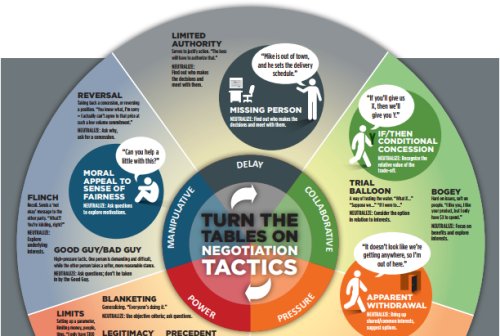Negotiation is a Fact of Life:
Negotiation is a fact of everyday work life. Whether for a company of one or one thousand, negotiations take place all day. Some negotiations take place with little or no notice such as when you and a co-worker decide where to eat lunch. Many negotiations, however, especially those with higher stakes, such as compensation issues, can be fraught with anxiety. Salaries, commissions, cash bonuses, the division of work among team members must often be negotiated in order to reach good agreements.
What is a "Good Agreement?"
A good agreement is more than just getting to "yes." A good agreement is one which is wise and efficient, and which improves relationships. Wise agreements satisfy both party's interests and are fair and lasting. With most long-term clients, business partners and team members the quality of the ongoing relationship is more important than the outcome of the particular negotiation. In order to preserve and hopefully improve relationships how you get to "yes" matters.
Getting to Yes:
In 1983 Roger Fisher and William Ury, wrote a ground-breaking book entitled "Getting to Yes: Negotiating Agreement Without Giving In." This book, now a classic, describes four principles for effective negotiation and the problems with "positional bargaining."
The Problem With Positions:
Negotiations commonly follow a process of "positional bargaining." Positional bargaining represents a win-lose, versus a win-win paradigm. In positional bargaining each party opens with her position on an issue then bargains from the party's separate opening positions to eventually agree on one position. Haggling over a price is a typical example of positional bargaining, with both parties having a bottom line figure in mind. According to Fisher and Ury, positional bargaining does not tend to produce good agreements for the following reasons:
1) It is an inefficient means of reaching agreements.
2) The agreements tend to neglect the other party's respective interests.
3) Ego tends to be involved.
4) It encourages stubbornness thus harming the parties' relationship.
Principles Over Positions:
Principled negotiation offers perhaps a better way of reaching good agreements. This process can be used effectively on almost any type of conflict. Fisher and Ury developed four principles of negotiation.
Four Principles of Good Negotiation:
(1) Separate the PEOPLE from the Problem.
(2) Focus on INTERESTS, not Positions.
(3) Invent OPTIONS for mutual gain.
(4) Insist on using objective CRITERIA upon which to base agreement.
These four principles should be employed collaboratively at each stage of the negotiation process.
FIRST - Begin with an analysis of the situation or problem, of the other party's interests and perceptions, and of the existing options.
SECOND - Plan ways of responding to the situation and the other party's interests.
THIRD - Finally, the parties discuss the problem trying to find a solution on which they can agree.
Part 2Material adapted from Getting to Yes: Negotiating Agreement Without Giving In (Fisher & Ury, 1991)
